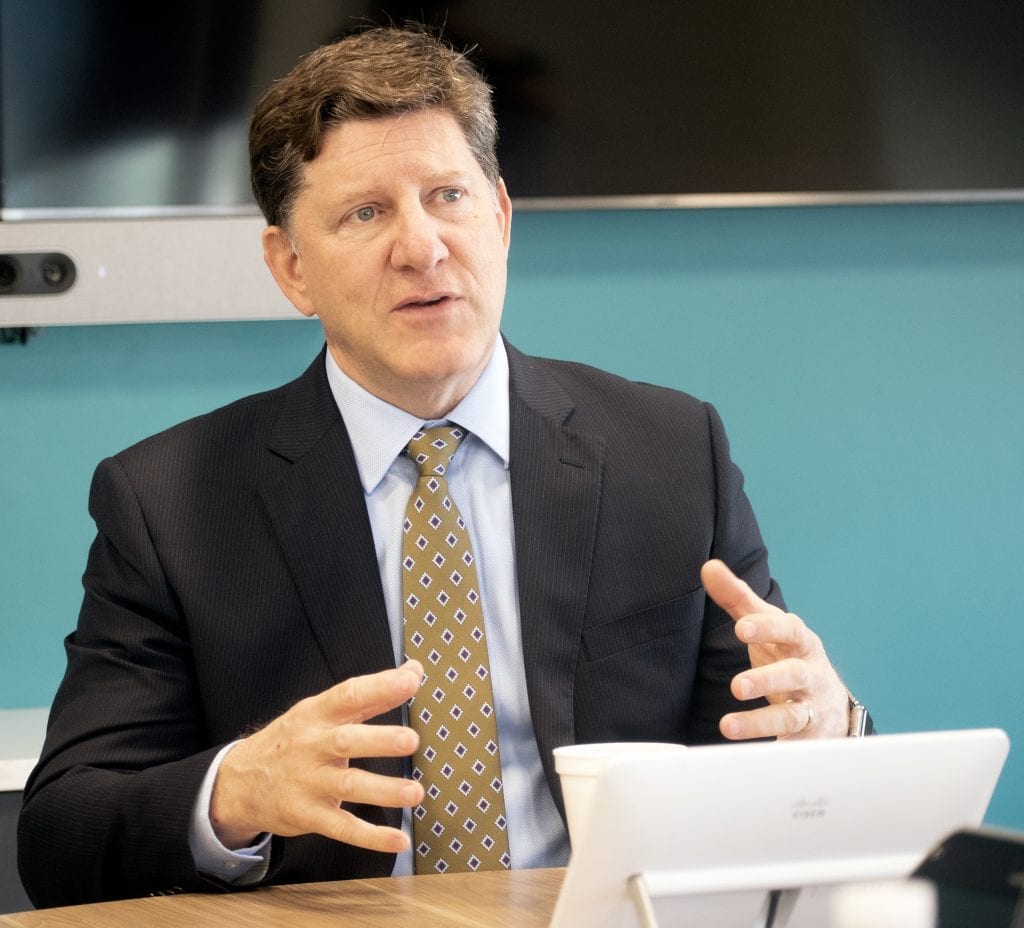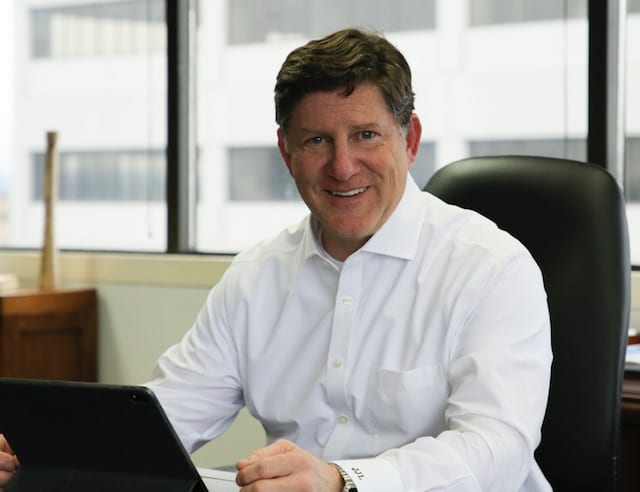by Jerome Wright –
Tennessee Valley Authority President and Chief Executive Officer Jeffrey “Jeff” Lyash Thursday (May 21) said he feels Memphis and the federally-owned power company can accomplish much if they remain partners.
“We think TVA is the best choice for Memphis. What we’d love to do is get through this, have Memphians confident they’ve made the right choice and we can face the future and start making things happen,” said Lyash in a telephone interview from TVA’s Memphis headquarters.
And, making the right choice is crucial for a number of reasons, among them cheaper electric bills for consumers and economic development initiatives that uplift communities, and attract businesses and their jobs.
That is important for a city where 26.8 percent of its citizens live below the poverty line; 31 percent for Memphis’ African-Americans, according to the latest Census estimates. A little more than 64 percent of the city’s estimated 652,000 citizens are African Americans.
The authority’s board of directors appointed Lyash, a veteran utility executive, to head the agency in February 2019. TVA, created in 1933, is the nation’s largest public utility. Memphis has been a partner since Nov. 6, 1934.
The “get through this” comment from Lyash was a reference to the roiling discussions taking place about whether Memphis’ city-owned utility, Memphis Light, Gas and Water Division (MLGW), should stop buying electricity from TVA.
Supporters of the split say it would save Memphis anywhere from $453 million to $547 million annually. Memphis and Shelby County collectively pays TVA about $1 billion a year for electricity.
The MLGW board, with input from the utility’s president, J. T. Young, will make the final decision. MLGW has commissioned a Power Supply Advisory Team to make recommendations to Young and the board, based on a detailed Integrated Resource Plan from Siemens that will spell out different arrangements, what they cost and the variables.
Beyond the savings, advocates for a change question TVA’s long-term viability because of its debt, about $21.4 billion.
“TVA does not have a crushing debt burden. As a matter of fact, among our peers, we have the lowest debt for the assets, with the strongest balance sheet,” Lyash said.
“That’s how we were able to step up during this COVID-19. We’re providing $2 billion worth of credit support for local power companies across the valley that are struggling financially. This is a strong organization … All that, frankly, is just misinformation.”
Some change advocates have implored Mayor Jim Strickland and the Memphis City Council to take action. However, it’s MLGW’s call.
For Lyash, though, it is not about who makes the decision.
“What’s really important is who bears the burden of whatever decision is made – that’s the people of Memphis.”
Others are urging the utility to move cautiously, citing, among other things, that MLGW possibly would have to invest some $8 billion to build any power plants or transmission lines needed for power from elsewhere.
Lyash said if Memphis, TVA’s largest customer, decides to move on, MLGW will not be able to use TVA’s infrastructure, including the new Allen Combined Cycle Natural Gas Plant, to provide electricity to its customers.
“The TVA built the Allen Plant and we built the transmission service to serve 10 million people across the valley – 154 local power companies. If Memphis leaves the system, you leave that behind because that was built not just to serve Memphis, but to serve the whole Tennessee valley.
“So, TVA doesn’t have any interest in selling that plant. We don’t have any interest in allowing other companies to use our transmission. The reason is because we fully utilize them for the benefit of our customers and we have to continue to do that,” he said.
Lyash acknowledged the long-held perception in some Memphis circles that TVA takes billions out of Memphis, but does not fairly reciprocate in investing in the city.
“I can’t change the past. It’s even difficult to change the perception of the past. All I can focus on is what we can do together going forward. Because that’s really what’s important….
“The perception that TVA’s presence in Memphis is not what it should be, I agree with that … I think that’s something that has my commitment to change in future.”
He said there were a number of reasons for the perception, but that over the last two decades “the notion of partnership broke down and MLGW and the city didn’t always want to see TVA or hear TVA.
“TVA maybe used that as an excuse not to do that, but I think the underlying root cause is we never developed a partnership here the way we need to.”
Some African-Americans do not think TVA has done enough to help uplift impoverish African-American communities and Lyash said he is aware of that.
“I’ve been trying to learn and listen here. I certainly think TVA has been a good partner for Memphis and we’ve certainly done an excellent job of attracting economic development and helping this city to grow and prosper.
“But I’ll also say that TVA hasn’t adjusted its programs and approach well enough for the specific needs of Memphis.”

That fact, he said, was “brought home clearly” in his first few months on the job when he met with representatives of the faith community here, including the Rev. Keith Norman, senior pastor of First Baptist Church-Broad Avenue, “where they told me, ‘You guys have great energy efficiency programs, but, you know, a high percentage of our population are renters. And the interests of the landlord on becoming more energy efficient aren’t aligned with the interests of the tenant. Can you do more there?’”
They continued, he said, by telling him TVA does a great job with economic development, but that development doesn’t always trickle down.
He said Norman asked, “Can’t you target economic development for underserved areas? Can’t you target economic development at small minority-owned businesses?”
Norman was right about both those things, Lyash said, “But we can’t do this ourselves. … We have to partner with MLGW and the city of Memphis, and we can’t do it in a month or a year.
“We’ve got to be committed to it for decades. I think this is one of the challenges for Memphis and it’s a challenge of TVA. It fits right into our mission.”
Pointing to TVA’s role in helping bring an Amazon fulfillment center to the Raleigh-Frayser area that will employ about a 1,000 people, Lyash said, “I think there are other things like that we can do to take the programs we do well and make them work better for the special needs that Memphis has.”
Throughout the interview, Lyash stressed the importance of maintaining the TVA-Memphis partnership.
“I think there are great things we can do together. As partners we can lower rates. We can deploy solar here in a way you couldn’t do on your own. We can focus on economic revitalization of the inner city here in Memphis, where I know there are struggles.
“We can work together to reduce the energy burden. You got a low price, but you have high energy disbursement because energy efficiency isn’t strong here; because median household income needs to be raised and we can work on making that better.”
MLGW is on a five-year contract with TVA and has to give the authority five years notice to leave the system. TVA is seeking a 20-deal with MLGW. Why?
“We offered to our local power companies last August a 20-year partnership agreement … because we think of the issues we face in the energy sector. We want to be highly competitive to a crack industry.
“We’ve got to drive down greenhouse gas emissions. We’ve got to make investments in technology, electric vehicles … energy efficiency, renewables.
“In order to be that, it’s best if we partner together and we make those investments knowing that we’re going to keep at this until we are successful over the next two decades,” Lyash said.
So far, 140 of TVA’s partners have signed on to the long-term deal, Lyash said, which for Memphis would come with a $22-million-a-year lower electricity price and, among other things, a strong effort to create renewable energy, namely solar.
“TVA has been a tremendous partner (with Memphis) on economic development. Since 2012, TVA has brought over 40,000 jobs to Memphis and over $5.5 billion of investment. So economic development is a tremendous advantage,” Lyash said.
Right now, though, advocates for a change are looking at the estimated billions in savings over time if MLGW decides to buy electricity from another provider.
To them, that also is economic development in terms of lower costs translating to lower electric bills for consumers and an enticement for industries looking for locations that have low energy rates.
(Jerome Wright is deputy editor for The New Tri-State Defender. Reach him at jwright@tsdmemphis.com.)




